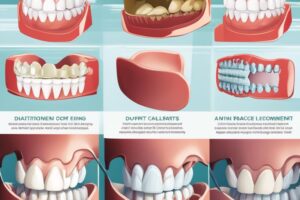Just as imperative as brushing and flossing daily, saliva plays a crucial role in ensuring oral health and proper mouth function. This often-overlooked fluid produced by the salivary glands is a dynamic biological fluid with numerous benefits for maintaining a healthy mouth. From aiding in digestion to fighting off bacteria, saliva performs a variety of functions that are vital to the well-being of our teeth and gums. Understanding the composition, function, and role of saliva can provide insights into how to better care for our oral health.
Key Takeaways:
- Saliva plays a crucial role in maintaining oral health and function. It helps in the process of digestion, prevents tooth decay by neutralizing acids, and protects against oral infections.
- Saliva aids in the remineralization of teeth. It contains minerals like calcium and phosphorus which help to strengthen tooth enamel and repair early tooth decay.
- Dry mouth can lead to oral health problems. Insufficient saliva production can result in bad breath, tooth decay, gum disease, and difficulty in speaking and swallowing.
Composition of Saliva and Its Functions
Physical and Chemical Properties of Saliva
Composition of saliva consists of water, electrolytes, mucus, enzymes, and antibacterial compounds. Saliva plays a crucial role in maintaining oral health by lubricating the mouth, aiding in swallowing and digestion, and regulating the pH balance to prevent tooth decay.
Enzymatic and Antibacterial Components
With a complex composition, saliva contains enzymes like amylase and lysozyme that help in breaking down food particles and fighting bacteria respectively. The antibacterial properties of saliva act as a natural defense mechanism against harmful microbes, preventing oral infections and promoting overall oral hygiene.
Saliva not only helps in maintaining oral health by washing away food particles and bacteria but also aids in the remineralization of tooth enamel. Furthermore, the enzymatic components in saliva play a role in initiating the digestion process, starting with the breakdown of carbohydrates through the action of amylase.
Saliva’s Role in Oral Hygiene
Natural Cleaning Mechanism
It is fascinating how saliva acts as a natural cleanser in our mouths. Saliva helps wash away food particles and debris that can lead to plaque buildup and eventually, tooth decay. This natural cleaning mechanism also helps keep our breath fresh and our mouths feeling clean.
Neutralizing Acids and Remineralizing Teeth
To maintain optimal oral health, saliva plays a crucial role in neutralizing acids and remineralizing teeth. When we consume acidic foods or beverages, saliva works to neutralize the acid and protect our enamel from erosion. Additionally, saliva contains imperative minerals like calcium and phosphate, which help remineralize and strengthen our teeth.
Natural saliva flow can prevent the development of cavities by neutralizing acids and aiding in the remineralization of enamel. Maintaining a healthy level of saliva production is key to oral health.
Saliva in Digestion and Taste
The Digestive Enzymes in Saliva
For efficient digestion to occur, saliva plays a crucial role. Saliva contains enzymes like amylase, which helps break down carbohydrates into simpler sugars like maltose. This process initiates the digestion of carbohydrates even before they reach the stomach, aiding in the overall digestive process.
Saliva’s Contribution to the Sensation of Taste
Taste sensation is not just about the flavors of foods but also about the role of saliva in perceiving these flavors. Saliva contains proteins that bind with molecules in food, aiding in the transport of these molecules to taste receptors on the tongue. This interaction between saliva and food molecules helps enhance the perception of taste.
The balance of saliva in the mouth is crucial for maintaining taste perception. Dehydration or conditions that reduce saliva production can lead to a diminished ability to taste flavors, affecting one’s overall enjoyment of food. Additionally, the lubrication provided by saliva helps in the swallowing process, ensuring food moves smoothly down the esophagus.
Salivary Gland Disorders and Oral Health
Impact of Hypofunction and Xerostomia
Despite its often overlooked importance, saliva plays a crucial role in maintaining oral health and function. On the other hand, conditions like hypofunction and xerostomia, commonly known as dry mouth, can significantly impact an individual’s oral health. Xerostomia not only leads to discomfort and difficulty in speaking and swallowing but also increases the risk of dental caries, infections, and periodontal diseases.
Diseases Affecting Salivary Glands
Hypofunction in the salivary glands can be caused by various diseases affecting these vital structures. Diseases such as Sjögren’s syndrome, viral infections like mumps, autoimmune disorders, and even certain medications can impair the normal functioning of the salivary glands. Salivary gland disorders can not only affect the quantity of saliva produced but also its quality, leading to a range of oral health issues.
Protective Measures and Saliva Stimulation
Strategies for Maintaining Salivary Flow
Unlike other bodily fluids, saliva has inherent protective properties that help maintain oral health. An imperative aspect of oral health is the stimulation of saliva flow. Strategies for maintaining salivary flow include staying hydrated by drinking water regularly, chewing sugar-free gum to stimulate saliva production, and avoiding foods and drinks that can dry out the mouth, such as caffeine and alcohol.
Treatments for Salivary Gland Disorders
Salivary gland disorders can disrupt the production of saliva, leading to dry mouth and potential oral health problems. Salivary gland disorders can be caused by infections, blockages, or even autoimmune conditions. Treatment for salivary gland disorders may include medication to stimulate saliva production, sialogogues to promote saliva flow, or in severe cases, surgical intervention to remove blockages or repair damaged glands.
The importance of addressing salivary gland disorders promptly cannot be overstated. Without proper treatment, individuals may experience dental decay, difficulty swallowing, and oral infections. Therefore, it is crucial to consult with a healthcare professional if you suspect any issues with your salivary gland function.
Conclusion
Drawing together various functions such as digestion, protection, and lubrication, saliva plays a crucial role in maintaining oral health and function. Its antimicrobial properties help combat harmful bacteria, while its buffering capacity aids in neutralizing acids that can erode tooth enamel. Additionally, saliva assists in the process of chewing, swallowing, and speech by keeping the oral cavity moist and facilitating the movement of food. Understanding the importance of saliva underscores the significance of proper hydration, regular dental care, and overall health in ensuring optimal oral health and function.
FAQ
Q: What is the role of saliva in maintaining oral health?
A: Saliva plays a crucial role in maintaining oral health by helping to keep the mouth clean and hydrated. It contains enzymes that aid in digestion, helps to neutralize acids that can cause tooth decay, and prevents bacterial overgrowth by washing away food particles and plaque.
Q: How does saliva contribute to the function of the mouth?
A: Saliva helps to lubricate the mouth, making it easier to chew, swallow, and speak. It also contains antibodies that help to fight off bacteria and viruses, contributing to the overall health of the mouth and preventing infections.
Q: What are some factors that can affect saliva production and quality?
A: Factors such as dehydration, certain medications, medical conditions like Sjögren’s syndrome, and aging can affect saliva production and quality. It is important to stay hydrated, practice good oral hygiene, and visit your dentist regularly to ensure optimal saliva production and oral health.







